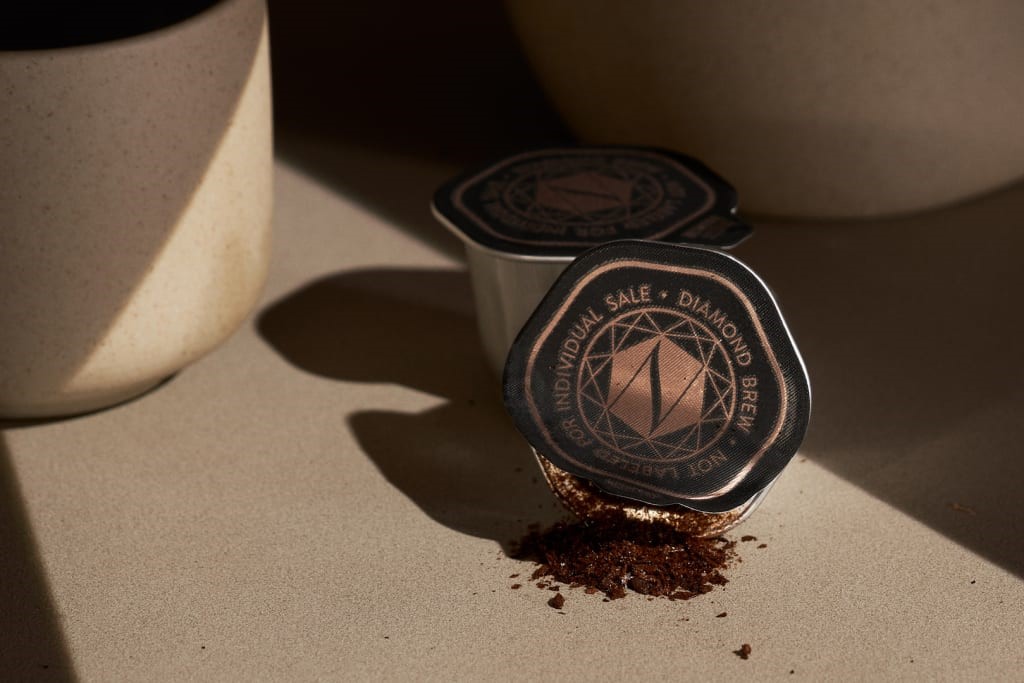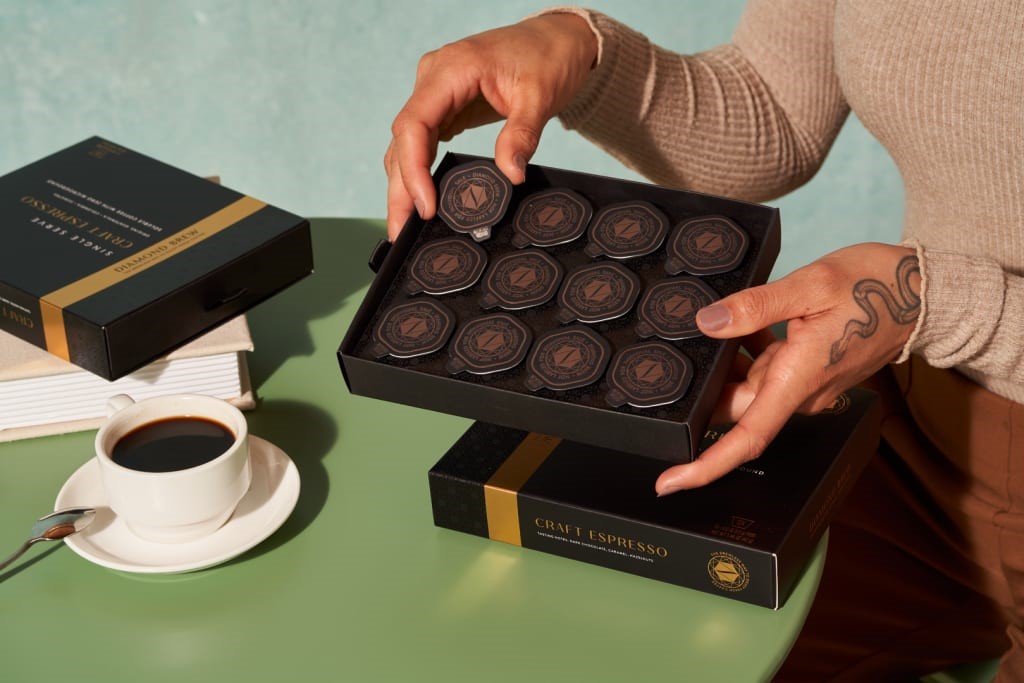This startup’s ‘brewless’ coffee is more than just a new way to say instant
July 31, 2024
This startup’s ‘brewless’ coffee is more than just a new way to say instant
Diamond Brew’s approach to freeze-drying freshly brewed coffee retains flavor and caffeine in an instant option.
Given the importance consumers place on convenience, you’d think the quickest coffee fix possible would be the most attractive. But most coffee drinkers are picky. Even if they do so begrudgingly, they’ll sacrifice an extra minute and an extra dollar for a high-quality brew. They don’t want that instant stuff.
Amid a move toward artisan home brewing from consumers and convenient prepackaged cold-brew options from established brands and clever startups, Chicago-based Diamond Brew “brewless” craft espresso is wading into the category with a product on the coffee market that serves as an alternative both to equipment-heavy coffee making and traditional instant coffee. With its approach, Diamond Brew aims to be more than just a clever rebranding of the now-passé idea of coffee crystals.
“Consider us the instant 2.0,“ says founder Douglas Yu, who wanted to marry quality and convenience with Diamond Brew, which launches this week. “I was walking down the grocery aisle one day to realize there’s not a single instant coffee that tastes like freshly brewed coffee.”

Yu knows what makes a good CPG company. After moving to Boston from China 12 years ago to get a journalism degree at Emerson College, he moved to Chicago to cover venture capital in the food and beverage industry for leading publications. Armed with the knowledge and relationships he gained from that work, he’s grounding the Diamond Brew venture in his own experience evolution as a coffee drinker.
“I grew up drinking instant coffee since I was 15 years old,” Yu says. “It was kind of a culture shock for me to realize how every single household in the U.S. has a coffee machine. That was actually my first time tasting what real coffee beans should taste like.”

Like instant coffee, Diamond Brew is a soluble coffee product, but Yu says that’s where the similarities between instant and Yu’s brewless coffee—a term he trademarked—end.
The company has created a proprietary freeze-drying process that locks in the flavor of freshly brewed coffee concentrate in a -40? airtight tunnel. Once frozen, it’s cracked into tiny shelf-stable shards. Instant coffee, on the other hand, is typically dehydrated or spray-dried into a powder form. “[Those use a] high temperature, high pressure environment. So the end result is very stale,” according to Yu. “They’re typically around 30 to 50 milligrams of caffeine.”
Conversely, each Diamond Brew pod contains 160mg of caffeine (more than a double shot of espresso) with a crema that forms on top once it’s stirred—something rarely seen from instant coffee.
“While instant coffee still accounts for nearly 40% of all coffee consumed worldwide, most products on the market can hardly deliver the freshly brewed flavor,” says Michael Costello, who serves as CEO of vitamin retailer GNC and is one of Yu’s investors alongside Dream Ventures, Entrepreneur Ventures, and Kali Mata Family Office. Yu’s “keen eye for creating a top-tier product,” that drew Costello in is evident in Diamond Brew’s branding, which positions it as an affordable luxury option.
Each $29.88 box contains 12 sealed, aluminum pods that slide out of a matte black case with gold accents. The product’s aesthetic makes it easily giftable, and its pod size also makes it easy to travel with.

“I stay at a lot of hotels,” Yu says. “And one of my pet peeves, probably similar to other travelers, [is] that plastic coffee machine sitting in your hotel room with paper cups covered with a plastic bag.” Since they’re not liquid, Diamond Brew’s pods aren’t subject to TSA’s liquid restrictions, which Yu says ensure that if someone has water (hot or cold), they can have Diamond Brew coffee. Its first variety is a strong, medium-roast espresso that contains notes of dark chocolate, caramel, and hazelnut.
One of the biggest competitors to Diamond Brew is likely Blue Bottle Coffee’s popular Craft Instant Coffee, which launched a new variety this month. Blue Bottle has also been aggressive in marketing via the growing TikTok Shop, where Diamond Brew will be selling alongside direct sales on its website. “I feel like TikTok is a must-not-miss opportunity for this decade of CPG,” Yu says.
It’s a play that appeals to Gen Z and millennials, groups that enjoy a good espresso or latte, but may not want to drop hundreds of dollars on an espresso machine. Diamond Brew also has a sustainability angle, including all elements of its packaging being fully recyclable, and it donating used coffee grounds from its manufacturing process to Ikea, which uses them to build furniture.
As he invested in his bet that people want a new way to drink coffee, Yu found that Diamond Brew joins a tradition of soluble coffee in the Windy City. The first U.S. patent for soluble coffee was granted in Chicago in 1903 to Japanese-American chemist Satori Kato. “It felt like, as a fellow Asian American founder launching this new type of soluble coffee, this is no coincidence,” he says. “All the signs [were] pointing in a direction in which I have to do this.”
ABOUT THE AUTHOR
Fast Company
(17)



